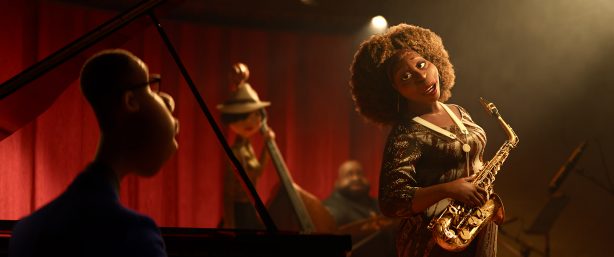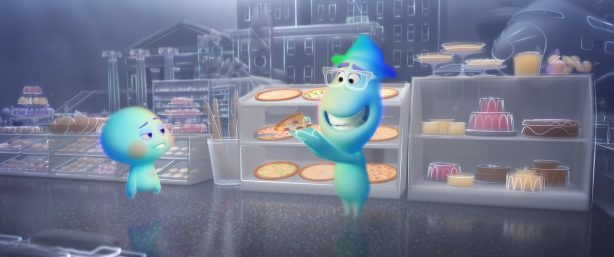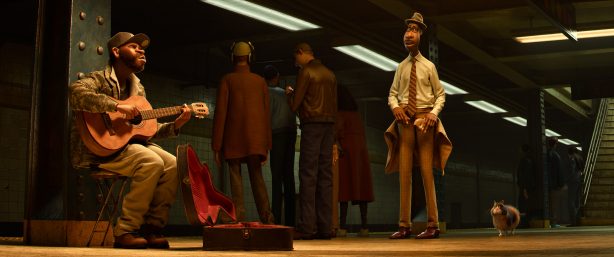From Toy Story to Coco, music has always been an essential element in Pixar Animation Studios’ films. But it plays an integral role in the storytelling of Soul, premiering on Disney+ December 25. The feature film centers on Joe Gardner (voice of Jamie Foxx), a middle school band teacher who dreams of becoming a professional musician… until a small misstep takes him from the streets of New York City to The Great Before (a place where new souls develop their personalities, quirks and traits before being sent to Earth).
Soul called for two distinct styles of music to help illustrate the familiar and unfamiliar settings. Academy Award®-winning director Pete Docter and co-director Kemp Powers called upon Oscar® winners Trent Reznor and Atticus Ross, from Nine Inch Nails, to write an original score that drifts between the two worlds, while Grammy® nominee Jon Batiste was brought on to do the original jazz compositions and arrangements for scenes on Earth.

“With Trent and Atticus, it just sounds so different and beautiful and so perfect for the film,” says Docter. “And Jon’s music really shaped everything about the main character.” Praising their “exciting” and “unexpected” musical contrast, the film’s producer, Dana Murray, adds, “This is like nothing we’ve ever done before. I love the combination we have.”
Soul marks the first time Reznor and Ross have composed music for an animated film, though their approach was similar to live-action. Says Reznor, “Our first step is always to listen and really try to understand where the filmmakers are coming from—what they’re seeing, what they’re imagining. We spent a lot of time discussing how you’re supposed to feel when you’re first exposed to the Soul world. Then we went back to our studio, which is filled with a variety of real, imagined and synthetic instruments, and spent the first chunk of time experimenting with different arrangements and different instruments and seeing what felt emotionally right to create the fabric of this world.” According to Ross, they hoped to help with the world building. “There’s The Great Before, The Great Beyond, The Astral Plane, The You Seminar,” he says, citing a few areas featured in the film. “Every place needed its own identity.”

Meanwhile, Batiste pitched “putting together a large, multi-generational ensemble that would feature a range of musicians from living jazz legends to young lions.” The filmmakers liked his idea, Batiste says: “We were able to do that over the course of several recording sessions, which is a historic feat! The age range of the band is 95 years old to 19 years old.”
As Batiste worked his magic, animators studied his movements. Says Powers, “We jokingly said that Jamie Foxx plays Joe’s body, but Jon Batiste plays his hands. We recorded Jon playing all of the original songs that Joe plays in the film, and the animators used him as a reference to model for Joe Gardner throughout the film. It’s some pretty virtuosic stuff!”
The filmmakers also consulted professionals from the world of jazz, including Terri Lyne Carrington, Daveed Diggs (voice of Paul), Herbie Hancock and Ahmir “Questlove” Thompson (voice of Curley). “They already had so much of it right in the script when I first joined,” says Carrington. “I really wanted the film to capture the joy of the music, the joy of the musicians. So often pain and struggle is affiliated with the blues, jazz and even modern Black music, so it was nice to see that their take on it really captured the joyous part.”

Unlike most Pixar films, much of the music in Soul was written and recorded before the animation neared completion. “We wanted to be able to animate to the music instead of trying to post-sync it,” Docter explains. “That quite literally shaped the sequences as well.”
Eventually, Batiste, Reznor and Ross had the opportunity to compare notes. “The songs and the score mostly exist in separate worlds—Earth and The Great Before—so it worked better for us to not communicate at the start of the creative process since we wanted there to be a contrast between the two worlds,” says Batiste. “Once we were further into the process, we played each other some of the music, and that’s when their music started to influence my approach more. There are moments when our worlds collide, and for those moments we collaborated on the music together. It really was the blending two worlds.”